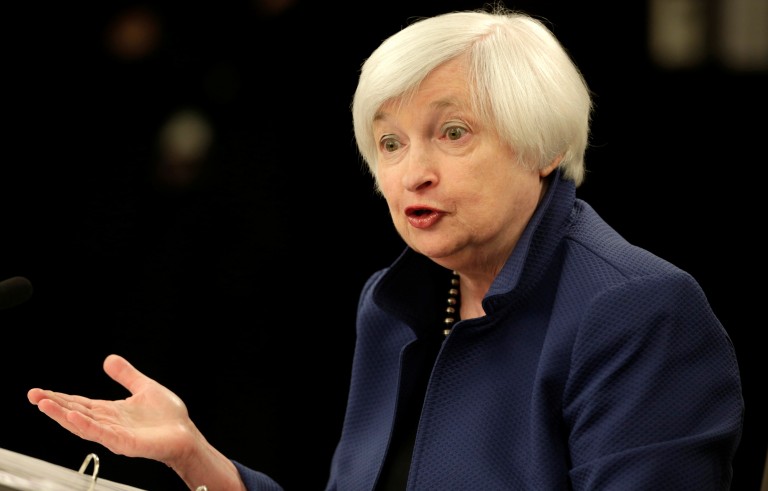JUDY WOODRUFF: After years of holding interest rates at near zero level, the Federal Reserve has entered a new phase, where short-term rates may be rising with greater regularity, as they did again today.
Jeffrey Brown looks at how the Fed has changed its outlook for the economy and the path ahead for policy-makers.
JEFFREY BROWN: In the past, Federal Reserve Chairwoman Janet Yellen has expressed concerns about the strength of the recovery. But, today, she told reporters, "We have confidence in the robustness of the economy and its resilience to shocks."
David Wessel joins me now for some Fed tea reading. He's with the Brookings Institution and a contributing correspondent to The Wall Street Journal.
David, a largely positive message, right, that sustainable growth continues and can continue. What is the Fed seeing?
DAVID WESSEL, Brookings Institution: Well, the Fed is seeing that unemployment has come down to the level that they consider full employment.
They seem to have a great deal of confidence that the economy has finally got some momentum. Janet Yellen cited the confidence of the business community and consumers that is showing up in surveys. So, I — and she was very, very upbeat, I think.
JEFFREY BROWN: Slightly higher inflation, but at a reasonable level, right? So, they're not worried about overheating this point.
DAVID WESSEL: They're finally getting to their goals of getting inflation close to 2 percent, getting unemployment down.
She noted that the labor force participation rate, the fraction of people who are working or looking for work seems to be going up a little bit, even though we have an aging population. So, she seemed to be very happy with the way the economy is going.
JEFFREY BROWN: But clearly signaling that this is the trend, right, that there will be more hikes to come?
DAVID WESSEL: This is the trend, but gradual. There was a lot of talk about gradual.
If you look at the forecast that the members of the Fed's policy-making committee said, they're basically seeing a couple of interest rate increases this year. That would still get us to, like, maybe 1.5 percent by the beginning of next year, still very, very low.
JEFFREY BROWN: So, you put together today and this kind of trend, what impact on consumers?
DAVID WESSEL: Well, this will mean that people are going to pay more to borrow. Mortgage rates have already gone up. They're around 4.2 percent for a 30-year mortgage. They were below 4 percent just a few months ago.
People will see — who borrow on their credit cards will see more. And, eventually, although it always takes a long time, people who have money in the banks, savings accounts, certificates of deposit, will see those rates start to creep up.

JEFFREY BROWN: Now, there has been a lot of discussion in recent weeks, especially as the Fed rates — raises the rates, vs. this — with a steady growth in mind — vs. the president, who talks about a real push forward, right?
DAVID WESSEL: Right.
JEFFREY BROWN: And really getting the economy going.
DAVID WESSEL: I think what the Fed fears is that, if Donald Trump gets big tax cuts and big spending increases that take effect right now, when the economy is close to full employment, they will have to raise rates more rapidly.
But Janet Yellen made clear that they're raising rates now without much anticipation of a big fiscal move. If they get one, I suspect they will raise rates more rapidly. She did, of course, make the point that if Congress and the president could agree on things that get the long-term growth rate up, the rate of productivity growth or bringing more people into the work force, that's something that the Fed would applaud.
JEFFREY BROWN: We heard her talk — she was asked a little bit about relations with the new administration. It's always a little delicate dance a bit, right?
DAVID WESSEL: Yes. I think she was prepared for the question. Right?
JEFFREY BROWN: Yes, clearly.
DAVID WESSEL: She said wonderful things about the treasury secretary. She said she had met Donald Trump.
I think her attitude is going to be, we have an independent Central Bank for a reason. I'm going to do what I think is right.
And I suspect that people at the Fed realize that, at some point, they're likely to be the target of an angry Donald Trump tweet when he thinks they're raising rates too fast.
JEFFREY BROWN: And just very quickly, in the meantime, the stock market just keeps going up, even with the rates going up.
DAVID WESSEL: Right.
JEFFREY BROWN: They don't seem to matter.
DAVID WESSEL: The stock market was relieved that the Fed didn't sound tougher today, and the stock market seems to figure that everything they like about Donald Trump will come true, and everything they're afraid of about Donald Trump will not come true.
JEFFREY BROWN: David Wessel, thank you, as always.
DAVID WESSEL: You're welcome.













